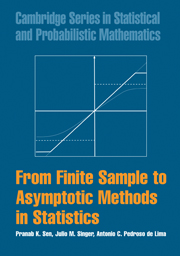Book contents
- Frontmatter
- Contents
- Preface
- 1 Motivation and Basic Tools
- 2 Estimation Theory
- 3 Hypothesis Testing
- 4 Elements of Statistical Decision Theory
- 5 Stochastic Processes: An Overview
- 6 Stochastic Convergence and Probability Inequalities
- 7 Asymptotic Distributions
- 8 Asymptotic Behavior of Estimators and Tests
- 9 Categorical Data Models
- 10 Regression Models
- 11 Weak Convergence and Gaussian Processes
- Bibliography
- Index
8 - Asymptotic Behavior of Estimators and Tests
Published online by Cambridge University Press: 05 June 2012
- Frontmatter
- Contents
- Preface
- 1 Motivation and Basic Tools
- 2 Estimation Theory
- 3 Hypothesis Testing
- 4 Elements of Statistical Decision Theory
- 5 Stochastic Processes: An Overview
- 6 Stochastic Convergence and Probability Inequalities
- 7 Asymptotic Distributions
- 8 Asymptotic Behavior of Estimators and Tests
- 9 Categorical Data Models
- 10 Regression Models
- 11 Weak Convergence and Gaussian Processes
- Bibliography
- Index
Summary
Introduction
In Chapters 6 and 7 we developed tools to study the stochastic convergence and the asymptotic distributions of a general class of statistics. These tools can be directly incorporated in the study of asymptotic properties of a variety of (point as well as interval) estimators and tests. However, many of the methods discussed in Section 2.4 rest on suitable estimating equations with solutions that, in general, do not lead to estimators that can be expressed as explicit functions of the sample observations. Even when such closed-form expressions are available, they are not exactly in the form of the statistics treated in Chapters 6 and 7. Similarly, for composite hypotheses, specially when the underlying distributions do not belong to the exponential family, test statistics may suffer from the same drawbacks. The classical maximum likelihood estimators and likelihood ratio tests generally have this undesirable feature, albeit they may have well defined asymptotic optimality properties. In this chapter, we consider a general method to obtain asymptotic properties for a very broad class of statistics that fall in this category. Basically, we provide a viable link to the topics considered in the preceding two chapters borrowing strength from the methodology outlined there.
In Section 8.2, using a uniform asymptotic linearity property we obtain the asymptotic properties of estimators generated by estimating equations like (2.4.21). Although the MLE is a special member of this family of estimators, we provide related specialized details in Section 8.3, because of its important role in statistical inference.
- Type
- Chapter
- Information
- From Finite Sample to Asymptotic Methods in Statistics , pp. 240 - 272Publisher: Cambridge University PressPrint publication year: 2009

